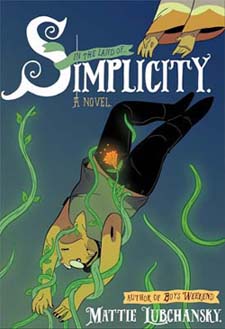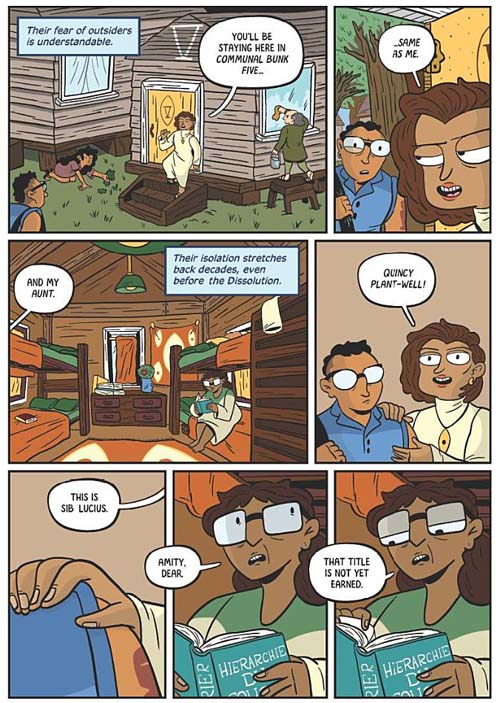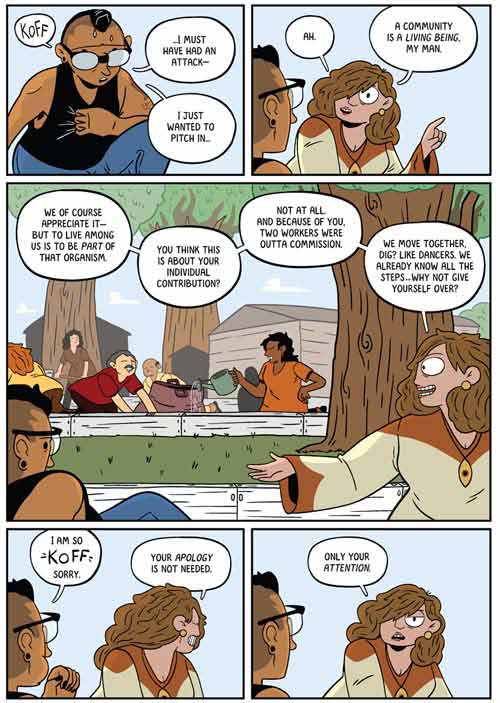
Simplicity
Mattie Lubchansky
Pantheon
$29.00
272 pages
Stories we tell ourselves about ourselves…
Clifford Geertz
Following the debut graphic novel Boys Weekend in 2023, Mattie Lubchansky returns with Simplicity, a story exploring culture, society, unchecked capitalism, and the desire to belong. Meet Lucius Pasternak, an ethnographer living in the year 2078. Pasternak has secured a rare opportunity offered by the Van Wervel Trust to study the Spiritual Association of Peers (SAP) residing in a small tightly knit community of Simplicity ambiguously located outside of New York City. The New York Lubchansky envisions is a walled off city state, an Administrative and Secured Territory or AST. The New York AST is one member of the Coalition of City States that has come about after whatever fate befell the United States. Opportunities to leave New York into “exurbs and unsecured territories” are rare and heavily regulated which makes Pasternak all the more eager to interview SAP members and document their culture since he will be the very first person allowed into the commune.
Despite preparation for the assignment Pasternak is quickly surprised by many differences upon being escorted to the community by Amity Crown-Shy. A bucolic landscape is dotted with a cluster of wooden buildings for communal living while folks tend raised garden beds and other perform sundry chores. Simplicity isn’t simply an idyllic settlement though. Lubchansky has created a complex society with its own ethics, clothing, naming conventions, kinship structures, beliefs, rituals, and history dating back to its founding by Gerry Estroke 1977. In his own words Estroke described Simplicity as a “far out place…” without taboos “…especially your hangups about sex and gender…” which is of great interest to the recently transitioned Pasternak.

Readers of Lubchansky’s cartoons at The Nib are aware of the cartoonist’s interest in making scathing political and social satire. The graphic novel format of Boys Weekend provided ample opportunity for Lubchansky to lampoon tech bros and capitalism when trans femme Sammie decides to attend the bachelor party of a friend and former coworker along with a small entourage of the soon to be groom’s techbros on the ultramodern technological El Campo island resort” where anything goes for a price”. With Simplicity the satirical component is amplified. Whereas the world outside of the tech wonderland of El Campo seems relatively normal, albeit one where transphobia is still experienced, there is an increasing ominous feeling of rampant technology controlled by New York’s ruling oligarchy. Lubchansky offers a flashback in which Lucius informs his former lover David of his impending trip. They have contrasting views of oligarchs. In David’s mind they’re all evil and it’s a “lesser of two evils” bargaining concept for Lucius which he uses to justify this assignment. Where do queer people like Lucius and David fit into this hyper reality? Simple. In society’s margins just like we do today where we go about life as best we can except in Lucius’ case he was plucked from obscurity seemingly for knowledge and expertise. Reading the sections involving the New York AST is especially unsettling when we see in real time the willingness of tech, business, and media oligarchs to associate with and capitulate to fascist power.
At some point while reflecting on Simplicity something in the back of my mind was stuck on Pasternak’s profession as ethnographer. Finally I remembered a conversation with an art professor over a decade ago. She and I were having coffee and talking about art and stories and she mentioned an unfamiliar name to me, that of Clifford Geertz. For three decades Geertz was considered the single most influential cultural anthropologist in the US. She told me the tl;dr version of Geertz and his wife’s time spent studying the people of a Balinese village discussed at length in his Deep Play: Notes on the Balinese Cockfight. Then she told me the Geertz quote which appears as this review’s opening…which my mind paraphrases as “stories are what we tell ourselves to understand our world.”

I believe this is in essence Lubchansky’s reason for creating Simplicity. As an ethnographer Lucius Paternak observes and studies other people and their cultures. A lot of the initial sequences echo Geertz’ recollections of the early weeks spent in the Balinese village including how Pasternak is met with suspicion by nearly all Simplicity residents until a serendipitous turning point. This is not to infer anything ill willed. Rather, it’s how people whether real or fictional act. While now being accepted by the community at large, Pasternak discovers a reluctance to take part in the Ritual. Rather, his late night wanderings lead to an encounter with a sublime force that can only be experienced. An experience that with each following encounter ineffably transforms Pasternak for the better. And in the nick of time once Pasternak is confronted by the ugly truth that he’s been set up the entire time.
Lubchansky gives Pasternak’s character the revelation that change can happen and then gives him the opportunity to make that change. Life is not just about observation or passivity. It is also about action. Simplicity is a story of hope and of an ordinary person who stepped up in the face of power. It is also a cautionary tale about how victors can and will change narratives to bend people to their will.
You’ll want to read Simplicity to learn just how much Pasternak changed the world.
Please visit Lubchansky’s site. Click the tour link to see if there will be an event near you!
Simplicity is available starting today, July 29th, 2025. Please support your local indy book store when possible. Copies may be ordered through Bookshop as well as other retailers listed on this page.
If all else fails or you prefer, copies may be purchased from Amazon.



